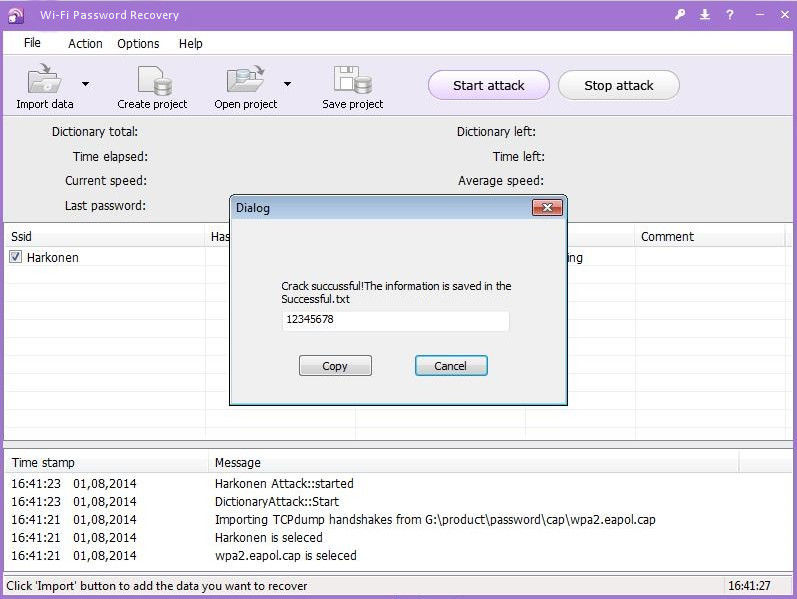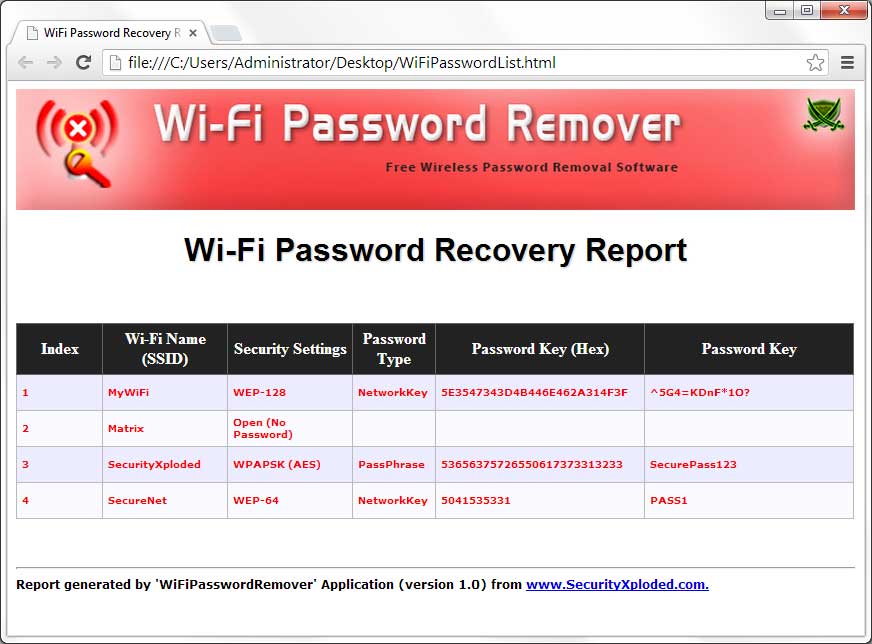
UC Browser - Fast Download. View all Android apps. Popular Windows Apps CCleaner. Please submit your review for RAR Password Cracker. Download the latest (2018) password lists and wordlists for Kali Linux. Works for cracking WPA2 wifi passwords using aircrack-ng, hydra or hashcat. Large Password List: Free Download Dictionary File for Password Cracking. While we have had good success rate with our standard password list passwords.txt.
Password list download below, best word list and most common passwords are super important when it comes to password cracking and recovery, as well as the whole selection of actual leaked password databases you can get from leaks and hacks like Ashley Madison, Sony and more.
Generate your own Password List or Best Word List
There are various powerful tools to help you generate password lists or wordlists for brute forcing based on information gathered such as documents and web pages such as:
– Wyd – password profiling tool
– Crunch – Password Cracking Wordlist Generator
– CeWL v5.1 – Password Cracking Custom Word List Generator
– RSMangler – Keyword Based Wordlist Generator For Bruteforcing
– The Associative Word List Generator (AWLG) – Create Related Wordlists
These are useful resources that can add unique words that you might not have if your generic lists, using a combination of generated lists, most common passwords and leaked password databases you can generate a very powerful selection of passwords for brute force cracking.
Also, add all the company related words you can and if possible use industry-specific word lists (chemical names for a lab, medical terms for a hospital etc).
And always brute force in the native language. There are some language-specific resources below.
Password List Download Best Word Lists
Although old, one of the most complete word list sets is here (easily downloadable by FTP too):
This includes a whole bunch of language specific resources too (Afrikaans, American, Aussie, Chinese, Croatian, Czech, Danish, French, German, Hindi, Japanese, Polish, Russian, Spanish and more).
This is another famous pass list txt which is over 2GB uncompressed, Argon v2:
Here we have 50,000 words, common login/passwords and African words (this used to be a great resource):
One of the most famous lists is still from Openwall (the home of John the Ripper) and now costs money for the full version:
Some good lists here organized by topic including surnames, family names, given names, jargon, hostnames, movie characters etc.
Packetstorm has some good topic-based lists including sciences, religion, music, movies and common lists.
French Spanish & Language Specific Word Lists
There’s a good French word list here with and without accents, also has some other languages including names:
Spanish password list that has 172122 words:
Russian wordlist that has 296790 words:
Swedish password wordlist that contains 24292 words:
Tools for Password List Brute Forcing
You can also check out some default password lists and if you aren’t sure what tools to use I suggest checking out:
Enjoy! And as always if you have any good resources or tools to add – do mention them in the comments.
Do you know what the world's most common passwords are?
Do you know what they look like?
You'll want to avoid them to be secure!
Thinking of Cloning?
This repository does not contain code, but links to a group of lists.
A clone may not be necessary to get the files you need.
Visit the downloads page for more information.
Check out the Password Trend Analysis - and learn!
I visualized the trends of passwords that appeared 10 times or more in the Version 1 files.The charts contain immediately actionable advice on how to make your passwords more unique.
Methodology: Why and How
The Why
Password wordlists are not hard to find. It seems like every few weeks we hear about a massive, record-breaking data breach that has scattered millions of credentials across the internet for everyone to see. If our data is leaked, we'll change our passwords, the hard-working security teams will address the vulnerabilities and everyone will wait until they hear about the next breach.
While leaks may be published with malicious intent, I see an opportunity here for the us to make ourselves a bit more secure online.
Passwords, by definition, are meant to be secret. If it weren't for these leaks, we might not have any idea what a password looks like. Sure, we might know the password to a friend's home Wifi network, or for a company expense account, but passwords are usually only intended to be known by the user and an authentication system.
But, consider this:
If you are never supposed to tell me yours, and I am never going to tell you mine..
How do we know that we aren't using the same passwords?
How do we know we aren't using the same passwords as millions of other people?
If crooks are the only ones who understand what common passwords look like, then the rest of us may never change our passwords! Without this knowledge, we may just continue believing that our password is one of a kind. Data shows that frequently, passwords certainly are not one of a kind.
This is confirmed year after year when password is found to be among the top 3 password for the umpteenth time in a row. Until we know what common passwords look like, we will come up with passwords that appear on dozens of leaks.
If any of your passwords has been published on the internet for everyone to see, then can you really claim it as your password?
The How
While studying password wordlists, I noticed most were either sorted alphabetically or not sorted at all. This might be okay computerized analysis, but I wanted to learn something about the way people think.
I determined that for the most practical analysis, lists had to be sorted in a manner that reflected actual human behavior, not an arbitrary alphabet system or random chronology.
For the better part of a year, I went to sites like SecLists, Weakpass, and Hashes.org to download nearly every single Wordlist containing real passwords I could find. After attempting to remove non-pertinent information, this harvest yielded 1600 files spanning more than 350GB worth of leaked passwords.
For each file, I removed internal duplicates and ensured that they all used the same style of newline character. Some of these lists were composed of smaller lists, and some lists were exact copies, but I took care that the source material was as 'pure' as possible. Then, all files were combined into a single amalgamation that represented all of the source files.
Each time a password was found in this file represented a time it was found in the source materials. I considered the number of times a password was found across all of the files to be an approximation of its overall popularity. If an entry was found in less than 5 files, it isn't commonly used. But, if an entry could be found more than 350 files, it is incredibly popular. The passwords that were found in the highest number of source files are considered to be the most popular and are placed at top of the list. Files that didn't appear frequently were placed at the bottom.
The giant source file represented nearly 13 billion passwords! However, since this project aims to find the most popular passwords, and not just list as many passwords as I could find, a password needed to be found at least 5 times in analysis to be included on these lists.
The end result is a list of approximately 2 Billion real passwords, sorted in order of their popularity, not by the alphabet.
Directories In This Repository

Files sorted by popularity will include probable-v2 in the filename
Real-Passwords
These are REAL passwords.
The files in this folder come from sites like https://github.com/danielmiessler/SecLists, https://weakpass.com/ and https://hashes.org/
Some files contain entries between 8-40 characters. These can be found in the Real-Passwords/WPA-Length directory.
Dictionary-Style Lists
Files including dictionaries, encyclopedic lists and miscellaneous. Wordlists in this folder were not necessarily associated with the 'password' label.
Some technically useful lists, such as common usernames, tlds, directories, etc. are included.
Analysis Files
Files useful for password recovery and analysis. Includes HashCat Rules and Character Masks.
These files were generated using the PACK project.
Attributions
- Ian Norden for helping with duplicates and volunteering his time to make me a little less noobish
- The folks over at OWASP's SecLists for providing sources and inspiration
- Sources like Weakpass, Crackstation, Hashkiller and Hashes.Org for inspiration and lists.
People Are Talking About Probable-Wordlists?!
Note that the author is not affiliated with or officially endorsing the visiting of any of the links below.
I found most (if not all) of these mentions by simply searching for the project in various engines
- Netmux/Joshua Picolet's Hashcrack 2.0 - CreateSpace Independent Publishing Platform; 2 edition (September 1, 2017) - ISBN: 978-1975924584
- Probable-Wordlists has made the Security Now Podcast! Shout out to Steve Gibson and Leo Laporte!
Btc4gen Password Txt
Thanks for the shout-outs!
Sep 7, 2012 - 3 Serial Killer Anatoly Slivko (mature / graphic). Community for running a children's club and won awards for the videos he did in his free time. Youtube serial killer videos.
Disclaimer and License
Wpa Password List Txt Download
- These lists are for LAWFUL, ETHICAL AND EDUCATIONAL PURPOSES ONLY.
- The files contained in this repository are released 'as is' without warranty, support, or guarantee of effectiveness.
- However, I am open to hearing about any issues found within these files and will be actively maintaining this repository for the foreseeable future. If you find anything noteworthy, let me know and I'll see what I can do about it.
The author did not steal, phish, deceive or hack in any way to get hold of these passwords.All lines in these files were obtained through freely available means.
The author's intent for this project is to provide information on insecure passwords in order to increase overall password security. The lists will show you what passwords are the most common, what patterns are the most common, and what you should avoid when creating your own passwords.
This work is licensed under a Creative Commons Attribution-ShareAlike 4.0 International License.